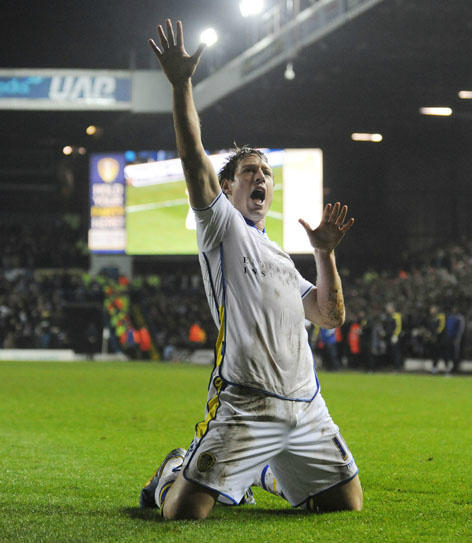 Part 1 Take Over My A*** - Results,
table and transfers
Part 1 Take Over My A*** - Results,
table and transfers
GFH's takeover complete, it was back to football business for Leeds.
Victory over Middlesbrough on 22 December took them eighth in the table
and hopeful that a splurge in the transfer window would spark a genuine
promotion push.
Warnock tried to temper the enthusiasm and hyperbole, denying via Yorkshire
Radio that he would be 'spending stupid money for the sake of it'. He
would try and get the right two or three players in, 'wheeling and dealing,
because that is what I have done all my career'. He said that he would
never spend £5 million on a player and just wanted support for the type
of player he sought. He had targeted a certain number of players but would
not confirm the details.
Ryan Hall and Michael Tonge made their moves to Elland Road permanent,
Alan Tate extended his loan from Swansea, El-Hadji Diouf signed a new
contract, and Everton midfield starlet Ross Barkley arrived on a month's
loan. Warnock had hoped to sign West Brom striker Chris Wood, but, to
the surprise of many, he was unable to match Leicester City's £1.25 million
bid. On the other hand, he was delighted when United resisted all approaches
for 19-year-old starlet Sam Byram, who had become a fixture in the side
after being blooded at the start of the season.
Warnock met chief executive Shaun Harvey to re-evaluate the transfer
strategy after reaching dead ends with approaches for several potential
signings.
As a priority, Warnock was after a striker, but it was a difficult market,
'a nightmare for managers'. The players he wanted were simply not on offer.
He talked of a 'domino effect', with potential sellers wanting a replacement
before being willing to deal.
He was bullish at the start of the month, saying nobody would leave that
he wanted to keep, although he expected enquiries for Becchio. However,
there would be no one leaving unless he agreed to it because he needed
every good player.
In the cold light of January, however, Warnock's hopes of retaining Becchio
were dashed.
The Argentine, well into his fifth year with United, was under contract
until the summer of 2014. His 15 league goals made him Leeds' top scorer
by a country mile and he had emerged from the Christmas period as the
club's tenth highest league goalscorer of all time.
His eye for the half-chance had brought him many admirers and Warnock
feared that, despite the presence of GFH, the January window would see
a repeat of previous seasons when the club's crown jewels had been tempted
away from Elland Road.
A number of those moves came after contracts had been allowed to run
down, but the tendency now was for United to capitalise while they could
still demand a fee.
Becchio had professed his commitment to Elland Road as recently as December,
but incessant talk of a transfer had turned his head.
On 24 January, the club confirmed that the club's highest earner, at
around £15,000 per week, had been the subject of two separate bids from
foreign clubs. He submitted a transfer request 'as financially he believes
his best interests are served by a move away from Leeds United'.
back to top
The move came at the very end of the window, with Becchio joining the
growing number of former colleagues at Norwich. Steve Morison made the
reverse journey as part of the deal with payment of £200,000 making up
the balance. The swap was not a success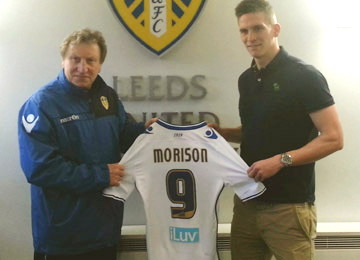 for either man, each having a disastrous time with their new club.
for either man, each having a disastrous time with their new club.
Warnock provided the obligatory talking up, insisting that even before
Becchio had asked for a transfer he had enquired about the availability
of Morison, who had been top of his want list. 'Steve meets all the requirements
of the striker we've been looking to bring in. For me, he is a player
who has everything. He can score goals from anywhere, whether it's 25
yards or a tap-in, he has pace, and he has all the attributes you want.'
After Morison opened his scoring account for United, in his third game
against Blackpool, the manager went even further, saying he would be 'a
legend here in a few years' and that the fans would love him to bits.
That declaration would come back to bite the manager.
Leeds also recruited former Liverpool left-back Stephen Warnock and the
exotically named loanee Habib Habibou, who barely ever played for the
club, but featured in an online video hurling a duck over a fence!
Shorn of Becchio's goal threat, the club's form dipped badly: they won
five of the six Championship matches leading up to the Middlesbrough victory,
but then won just two of the next eight.
The visit to Barnsley on 12 January was a watershed.
United went into the game on the back of three successive away defeats.
They had done well at Huddersfield on 1 December when a Becchio brace
inspired a 4-2 victory, but that was the only win on their travels since
the end of September.
There was little enthusiasm about the trip; Oakwell had become a bogey
ground for Leeds with no victories since 1997 and nine goals had been
conceded in their last two visits.
There were groans of despair when Warnock announced his selection. Why
was the limited David Norris in with Ross McCormack kicking his heels
on the bench? Had Colin completely lost the plot?
But the fans were used to this by now, they had been ground down by results
and performances and patience with the manager's pedestrian thinking was
wearing very thin.
It quickly became apparent that bottom club Barnsley, under the leadership
of caretaker manager David Flitcroft, were up for the game in a way that
Leeds simply were not. Much as they seemed to do every year against Leeds,
they belied their form, three successive league defeats, five league wins
all season, the poorest scoring average in the Championship. One struggled
to identify which team was at the bottom.
The mood grew darker as the game drew towards half-time, the fans sliding
into a slough of despond. The first few chants of 'Warnock, Warnock, time
to go' began to sound on the half hour and they grew in intensity as the
players trooped off at the break.
They prayed for better in the second half, but Chris Dagnall scored twice
just after the hour and despondency changed into boiling anger.
They all joined in the 'Warnock out' and 'Time to go' chants that became
incessant as the game petered out, 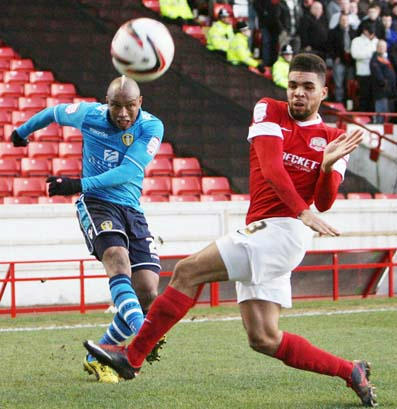 Leeds
never in it.
Leeds
never in it.
Even in despair, the fans, at least, were united.
back to top
Rob Atkinson penned an obituary for the Huffington Post.
'It's not safe to identify any one day, defeat or disappointment as the
nadir of Leeds United's fortunes just now. At the moment, takeover and
fresh start notwithstanding, they appear to be plummeting downhill faster
than a greased pig.
'Today's news that top scorer Luciano Becchio has submitted a transfer
request is another notable low point…Yet, you somehow have that uncomfortable,
chill feeling…however bad things may seem, there's plenty of scope for
them to get worse.
'Indeed, it's arguable that things have been worse…The run-up to the
2007/08 season, the club's first in the third tier of English football,
was catastrophic…But that season turned into a triumph of sorts.
'At present, in some superficial measures, things might seem better -
but in the most fundamental ways, they are significantly worse. Obviously,
the club now enjoys a higher status within the game - the dark days of
League One football are receding into the past, at least for the time
being. There have been high spots too, famous cup victories and the odd
satisfying away performance. At Elland Road, once a fortress notorious
for intimidating opponents, form has been patchy. And yet Premier League
teams have been put to the sword, and generally speaking the team will
give anyone a game on their own patch. The underlying problem today, though,
is more insidious than the acute emergencies immediately post-administration.
It is the creeping cancer of apathy that pervades the club now.
'It's not difficult to see the signs of this. Read any of the fans' forums,
and a pattern swiftly emerges. The supporters, by and large, are sick
of the way the club has been run over the past few years. Sick of paying
top dollar for a distinctly second-rate product. Sick of the club's habitual
prevarications over transfer policy, of seeing our best players form a
procession out of the exit door, sick to death of seeing lesser clubs
easily out-match us for wages and transfer fees, despite the fact that
our turnover and potential remain at the top end.
'Leeds United, a great name in English football by any measure, appears
to have been run on the cheap for a long time now. Investment is minimal,
the ability to retain promising players practically non-existent. The
supporters' expectations, born of great days in the past, remain high
- and why shouldn't they be? But those expectations show no sign of being
met, nor even approached. Last summer's long, drawn-out agony of a takeover
saga descended too often to the depths of farce, as rumour countered rumour,
and we all rode an internet-driven rollercoaster of optimism and despair,
over and over again. But once concluded, that saga has not spawned a legacy
of more investment and better club/fan relations. We appear to be stuck
with more of the same; the changes appear to have been purely cosmetic.
'On Saturday 12 January, Leeds United played Barnsley away, a fixture
that had produced humiliating three-goal thrashings in the previous two
seasons. This time around, it was only a two-goal thrashing, but the manner
of defeat - the abject failure to muster any real threat up front, and
the spectacle of midfield players gazing skywards as the ball whistled
to and fro far above them - was too much for the long-suffering band of
away fans in Leeds United colours. They complained, loudly. They advised
the manager to be on his way. They questioned the fitness of the players
to wear the famous shirt. The supporters feel they are being taken for
mugs, and they have had enough.
'All this has been true for a while - but for much of the past year,
change has been in the air, and it has seemed reasonable to expect that
things might be about to get better. Some of us dared to dream. But after
the final whistle at Barnsley's Oakwell ground, it seemed all of a sudden
quite clear that the options for change had been exhausted, and that the
future remains as bleak as it has been at any time since top-flight status
was relinquished nine long years ago.
'It may well be that, on that cold day in Barnsley, realisation dawned
that the club Leeds United once were is now dead and gone. What is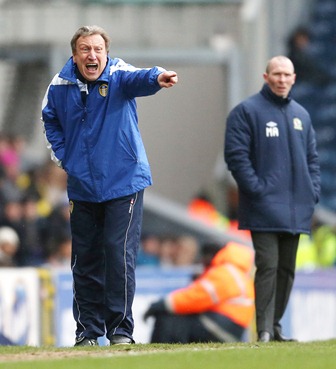 left behind may well still be worth supporting, but it is likely to be
a pale shadow of what we once knew. Yesterday, there were rumours of high-profile
signings - and you knew, you just KNEW, that we were being softened up
for more bad news. Today, it seems that Becchio is off, and we hear reports
that recent loanees didn't want to stay because of the money situation
up there. It all stinks of a club rotten to the core, and dead at the
top.
left behind may well still be worth supporting, but it is likely to be
a pale shadow of what we once knew. Yesterday, there were rumours of high-profile
signings - and you knew, you just KNEW, that we were being softened up
for more bad news. Today, it seems that Becchio is off, and we hear reports
that recent loanees didn't want to stay because of the money situation
up there. It all stinks of a club rotten to the core, and dead at the
top.
'Leeds United - one of the truly great names in English football. RIP.'
Warnock was in utter denial after the game, blanking the abuse and saying,
'You can't blame the fans...they pay their money. But I think I'm doing
a great job if I'm honest and with one or two additions that I've got
lined up...I understand their disappointment, but we know we need to strengthen.'
He did acknowledge the one-sidedness of the Barnsley game, however. 'We
were never at the races and they were up for it with it being a derby
game. We were non-existent in midfield in the first half. I thought we
started the second half okay. We made a couple of changes and we had a
few chances, something we didn't have in the first half. They should have
been out of sight in the first half. They were more up for it and we were
being caught and were sloppy in midfield. We owed a lot to the defence
who kept us in it. We were well beaten in the end.'
Falling behind to Birmingham in an FA Cup replay looked like another
nail in the managerial coffin, but a second half revival secured a glamorous
fourth round tie with Tottenham.
United performed superbly against Spurs, with McCormack's exquisite effort
earning a famous and well-deserved 2-1 victory to add to recent knock-out
successes against glamour sides. But their run then went to pot as they
were walloped 4-0 at Manchester City in the fifth round.
Gifted teenager Chris Dawson enjoyed an impressive and long-awaited debut
on 1 April at home to Derby, but United lost 2-1. It was the sixth game
without a victory and Leeds had only won three times in the 15 Championship
games since New Year's Day. It was the final straw.
Warnock recognised the writing was on the wall, telling Yorkshire Radio:
'I think it is right for the club [if I go] now.'
back to top
The club took him at his word, with development squad manager Neil Redfearn
placed in temporary charge until a permanent replacement could be found.
While United were well above the relegation zone with six games remaining,
they were only five points clear of the four clubs covering places 19
to 22. It was essential that a mid-table malaise did not degenerate into
something more damaging.
Brian McDermott, who had led Reading to promotion to the Premier League
a year earlier, was appointed on a three-year contract on 12 April. Signing
such a well-regarded manager was a major coup for GFH Capital.
When asked whether he would be given the funds to rebuild the side, McDermott
said the owners had told him that they were determined to make United
a power again.
McDermott's reign began with victories against Sheffield Wednesday and
Burnley. 'We're Leeds United, we're passing the ball,' sang delighted
supporters, exhilarated at being rid of Warnock's despised hoofball. The
upswing in mood was unmistakable and on 26 April the club announced that
almost 11,000 season-tickets had been sold for the 2013/14 campaign.
United signed off with an impressive 2-1 victory at promotion-chasing
Watford, ending the Hornets' chances of automatic promotion and setting
themselves up for what they hoped would be a productive summer of rebuilding.
Away from the onfield limelight, GFH Capital's brave new world was proving
anything but.
The financial results for the year to June 2012 revealed a major downturn;
there were marked decreases in turnover and gate receipts and an operating
loss of more than £3.3 million, presumably one of the reasons for the
protracted takeover process. Leeds City Holdings posted an overall deficit
of £536,000, despite the big money sales of Gradel and Howson, with the
figure dramatically down on the previous year's £3 million surplus. GFH
Capital's apprehension regarding cash flow issues was proven starkly well-founded.
Overall turnover dropped by more than £1.5 million and the issue was
exacerbated by a £1.5 million rise in the paybill. Another £8.6 million
had been lavished on the development of the stadium and the club could
not keep pace with the cash burn rate. It was on its way to a £9.9 million
loss for 2012/13.
GFH Capital stressed the importance of arresting the deteriorating relationship
with supporters. One of their early moves was to sell half-season-tickets,
beginning with United's game at home to Bristol City on 19 January.
The cost of tickets for an adult ranged from £255 to £329 but the move
had little impact. The average attendance was 21,469 prior to the Bristol
game; in the ten games that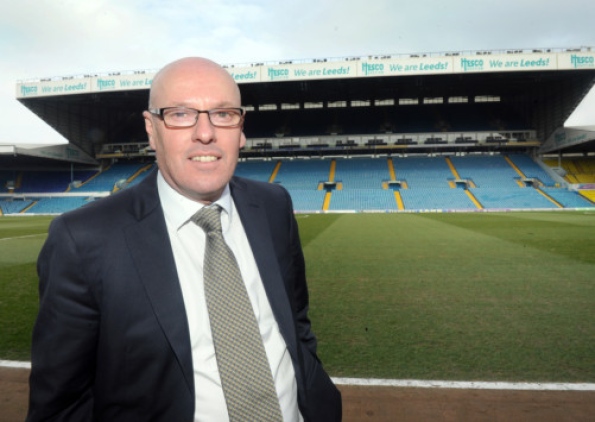 followed, it rose by 230, the average for the season lower even than the
Championship relegation season; in fact, it was the lowest seasonal average
since 1988. Receipts were boosted by five Capital One Cup-ties at Elland
Road, including the televised quarter-final against Chelsea. The crowd
of 33,816 was United's highest in any competition since the FA Cup clash
with Arsenal in January 2011.
followed, it rose by 230, the average for the season lower even than the
Championship relegation season; in fact, it was the lowest seasonal average
since 1988. Receipts were boosted by five Capital One Cup-ties at Elland
Road, including the televised quarter-final against Chelsea. The crowd
of 33,816 was United's highest in any competition since the FA Cup clash
with Arsenal in January 2011.
Mindful of the scale of the cashflow issues, GFH Capital were desperately
scouring around for 'strategic investors' who could offer financial support.
Given the length and depth of their due diligence one would have naïvely
expected such arrangements to have already been in place, but the size
of the challenge caught the bank completely unawares.
back to top
On 10 February, GFH Capital claimed to have rejected an offer for a majority
stake in the club from a Yorkshire consortium, said to be fronted by former
Leeds United director Adam Pearson, who had made public his desire to
return to football ownership, and Steve Parkin, chairman of Clipper Logistics,
long known to desire a stake in the club.
GFH Capital executives admitted that they were willing to sell a 30%
stake, raising fears that the club was already under pressure to secure
a major cash injection. They steadfastly maintained that they had the
necessary funds to take the club forward without the need for additional
investors and that United would flourish even without investment. However,
'we are of the belief that building a strong consortium of strategic investors
will better serve and protect and build our great club.'
In March 2013, GFH confirmed that they had begun negotiations to sell
the club. In their financial statements, which included something akin
to a sales prospectus, they stated that United was 'a bargain purchase'.
GFH's accounts revealed the price they had paid for the club, 'net cash'
of $33 million (£22 million) and assessed the club to be worth $10 million
(£7 million) over and above that sum. There were several conditional add-ons.
Bates had owned 73% of the club so would have been due £16 million. He
had never revealed how much he paid for Leeds, so it was not known whether
he made a tax-free profit on the sale.
Patel claimed that even in purely profit-motivated terms, the finance
house would do better to rebuild Leeds and win promotion to the Premier
League than sell the club immediately. He said that if it sold a majority
stake to a buyer without the funds capable of making Leeds successful,
'we become a minority shareholder in an investment not going anywhere'.
He added: 'We do not wish to make a short-term profit to miss out on the
£150 million-£200 million which could be made if the club wins promotion
to the Premier League.'
At the end of March, GFH Capital sold 10% of the shares to Bahrain-based
International Investment Bank for £2.5 million. As a result, IIB chief
executive Aabed Al-Zeera joined the board of Leeds City Holdings Limited.
They also confirmed that a further 3.33% had been acquired by Salah Nooruddin,
former IIB chief operating officer, who became chairman of the football
club on 22 April 2013.
On 4 April, it was reported that Steve Parkin's bid for a majority stake
was in doubt after an exclusivity agreement expired.
Parkin had not withdrawn his offer for a 51% shareholding, but it was
becoming less and less likely he would go through with a takeover. Two
months into negotiations, after he had agreed in principle to secure a
majority stake, Parkin was thought unlikely to follow through unless he
was able to secure financial support from investors in the Middle East.
His bid was originally thought to have the support of the wealthy Saudi
Arabian who considered buying Leeds while GFH Capital was finalising its
own deal in 2012, but his interest had faded. Parkin was in active discussion
with potential backers but had yet to secure any sort of guarantee.
The club announced further changes to the board on 1 July, with Haigh
appointed managing director and Harvey stepping down as chief executive,
to be replaced by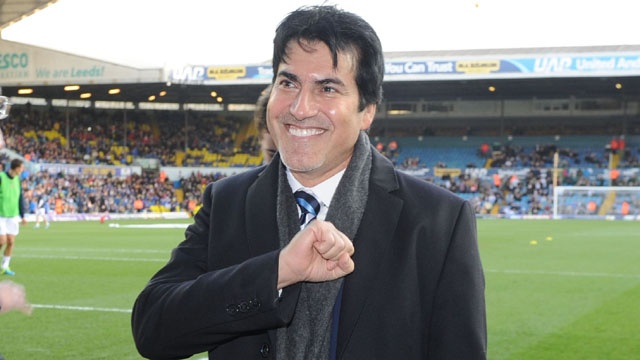 Paul Hunt, previously deputy CEO at Blackburn Rovers and commercial director
at Leicester and Wigan.
Paul Hunt, previously deputy CEO at Blackburn Rovers and commercial director
at Leicester and Wigan.
12 days later, Brendale Holdings, a Dubai-based company where Haigh was
serving as a director, advanced £11.3 million to the club as a means of
restructuring GFH's loans. The sum was secured against United shares.
On 26 July, completely out of the blue, GFH Capital removed Bates as
club pesident. It was announced that he would no longer have any role
with the club, prompting celebrations from supporters who had campaigned
for an end to his chairmanship.
back to top
The abrupt sacking came after Bates committed the club to a contract
to fly him regularly to Leeds from his Monaco home at a cost of £500,000
over three years. He claimed that GFH were fully aware of his expenses,
which had not changed throughout his eight years as chairman, that his
contract confirmed they would continue to be honoured, and that he had
never drawn a salary from the club.
Bates did not seek approval for the contract, arguing that he did not
need to do so and claimed, 'I saved the club money, because this was a
sterling contract, rather than euros, I did it in the best interests of
the club.'
What an altruistic soul!
Bates was clear that he would pursue a legal remedy, protesting that
GFH had agreed that he could continue to charge his usual expenses and
saying that he had the opportunity to renewing the travel expense contract
at a price lower than the existing deal. He checked with a solicitor who
confirmed that a director had the authority to commit a club or a company.
So, he went ahead and thought no more about it.
That was on 27 June. On 24 July, he received a hand-delivered letter
saying that he had breached his contract and asking him for his comments.
He rang the lawyer concerned to say there was a perfectly reasonable
explanation. 'Let's have a board meeting when I get back.' Then he received
a second letter telling him his contract had been cancelled.
Whether or not Bates COULD take the decision was less the point than
whether he SHOULD have done so without consulting his fellow directors.
That distinction escaped a man for whom business ethics seemed to be an
optional extra.
Part 1 Take Over My A*** - Results,
table and transfers












 Part 1 Take Over My A*** - Results,
table and transfers
Part 1 Take Over My A*** - Results,
table and transfers  for either man, each having a disastrous time with their new club.
for either man, each having a disastrous time with their new club. Leeds
never in it.
Leeds
never in it. left behind may well still be worth supporting, but it is likely to be
a pale shadow of what we once knew. Yesterday, there were rumours of high-profile
signings - and you knew, you just KNEW, that we were being softened up
for more bad news. Today, it seems that Becchio is off, and we hear reports
that recent loanees didn't want to stay because of the money situation
up there. It all stinks of a club rotten to the core, and dead at the
top.
left behind may well still be worth supporting, but it is likely to be
a pale shadow of what we once knew. Yesterday, there were rumours of high-profile
signings - and you knew, you just KNEW, that we were being softened up
for more bad news. Today, it seems that Becchio is off, and we hear reports
that recent loanees didn't want to stay because of the money situation
up there. It all stinks of a club rotten to the core, and dead at the
top. followed, it rose by 230, the average for the season lower even than the
Championship relegation season; in fact, it was the lowest seasonal average
since 1988. Receipts were boosted by five Capital One Cup-ties at Elland
Road, including the televised quarter-final against Chelsea. The crowd
of 33,816 was United's highest in any competition since the FA Cup clash
with Arsenal in January 2011.
followed, it rose by 230, the average for the season lower even than the
Championship relegation season; in fact, it was the lowest seasonal average
since 1988. Receipts were boosted by five Capital One Cup-ties at Elland
Road, including the televised quarter-final against Chelsea. The crowd
of 33,816 was United's highest in any competition since the FA Cup clash
with Arsenal in January 2011. Paul Hunt, previously deputy CEO at Blackburn Rovers and commercial director
at Leicester and Wigan.
Paul Hunt, previously deputy CEO at Blackburn Rovers and commercial director
at Leicester and Wigan.